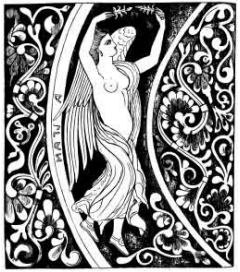Albina (mythology) on:
[Wikipedia]
[Google]
[Amazon]
Albina or The White Goddess is a 
goddess
A goddess is a female deity. In many known cultures, goddesses are often linked with literal or metaphorical pregnancy or imagined feminine roles associated with how women and girls are perceived or expected to behave. This includes themes of s ...
(possibly Etruscan __NOTOC__
Etruscan may refer to:
Ancient civilization
*The Etruscan language, an extinct language in ancient Italy
*Something derived from or related to the Etruscan civilization
**Etruscan architecture
**Etruscan art
**Etruscan cities
** Etrusca ...
) associated with the dawn
Dawn is the time that marks the beginning of twilight before sunrise. It is recognized by the appearance of indirect sunlight being scattered in Earth's atmosphere, when the centre of the Sun's disc has reached 18° below the observer's horizo ...
and the founding of Great Britain
Great Britain is an island in the North Atlantic Ocean off the northwest coast of continental Europe. With an area of , it is the largest of the British Isles, the largest European island and the ninth-largest island in the world. It is ...
.

''"The White Goddess"''
Robert Graves
Captain Robert von Ranke Graves (24 July 1895 – 7 December 1985) was a British poet, historical novelist and critic. His father was Alfred Perceval Graves, a celebrated Irish poet and figure in the Gaelic revival; they were both Celtic ...
' essay ''"The White Goddess
''The White Goddess: a Historical Grammar of Poetic Myth'' is a book-length essay on the nature of poetic myth-making by author and poet Robert Graves. First published in 1948, the book is based on earlier articles published in ''Wales'' magazi ...
"'' describes Albina as of one of fifty sisters (see Danaïdes) who named Albion
Albion is an alternative name for Great Britain. The oldest attestation of the toponym comes from the Greek language. It is sometimes used poetically and generally to refer to the island, but is less common than 'Britain' today. The name for Scot ...
. It is thought that the original name for Great Britain, Albion
Albion is an alternative name for Great Britain. The oldest attestation of the toponym comes from the Greek language. It is sometimes used poetically and generally to refer to the island, but is less common than 'Britain' today. The name for Scot ...
, was inspired by the White Cliffs of Dover
The White Cliffs of Dover is the region of English coastline facing the Strait of Dover and France. The cliff face, which reaches a height of , owes its striking appearance to its composition of chalk accented by streaks of black flint, deposi ...
, derived from the Latin albus, meaning "white" or "bright".
''"Etruscan Roman Remains in Popular Tradition"''
Albina is mentioned inCharles Godfrey Leland
Charles Godfrey Leland (August 15, 1824 – March 20, 1903) was an American humorist and folklorist, born in Philadelphia, Pennsylvania. He was educated at Princeton University and in Europe.
Leland worked in journalism, travelled extensivel ...
's 1892 collection of folklore "''Etruscan Roman Remains in Popular Tradition"''. According to Leland, Albina was an Etruscan __NOTOC__
Etruscan may refer to:
Ancient civilization
*The Etruscan language, an extinct language in ancient Italy
*Something derived from or related to the Etruscan civilization
**Etruscan architecture
**Etruscan art
**Etruscan cities
** Etrusca ...
goddess of light and ill-fated lovers. The accounts of Albina were obtained by word of mouth
Word of mouth, or ''viva voce'', is the passing of information from person to person using oral communication, which could be as simple as telling someone the time of day. Storytelling is a common form of word-of-mouth communication where one pe ...
from local and often illiterate peasants, some of whom were considered witches
Witchcraft traditionally means the use of magic or supernatural powers to harm others. A practitioner is a witch. In medieval and early modern Europe, where the term originated, accused witches were usually women who were believed to have use ...
or ''"Strega"''. Possibly a combination of other deities such as Alpanu
Alpanu sometimes spelt Alpnu or Alpan was an Etruscan goddess of the underworld. She is shown as wearing jewellery, a loose cloak, and sandals. She is otherwise naked, and for this reason is believed to also have been a goddess of sexual activity. ...
and Aurora
An aurora (plural: auroras or aurorae), also commonly known as the polar lights, is a natural light display in Earth's sky, predominantly seen in high-latitude regions (around the Arctic and Antarctic). Auroras display dynamic patterns of bri ...
, Albina is described as a beautiful flying woman (or fairy) and associated with light. The Albina referenced by Leland is likely only loosely related to the figure described in The White Goddess
''The White Goddess: a Historical Grammar of Poetic Myth'' is a book-length essay on the nature of poetic myth-making by author and poet Robert Graves. First published in 1948, the book is based on earlier articles published in ''Wales'' magazi ...
.
References
* * *External links
* * * Etruscan goddesses Love and lust goddesses Solar goddesses Dawn goddesses {{deity-stub